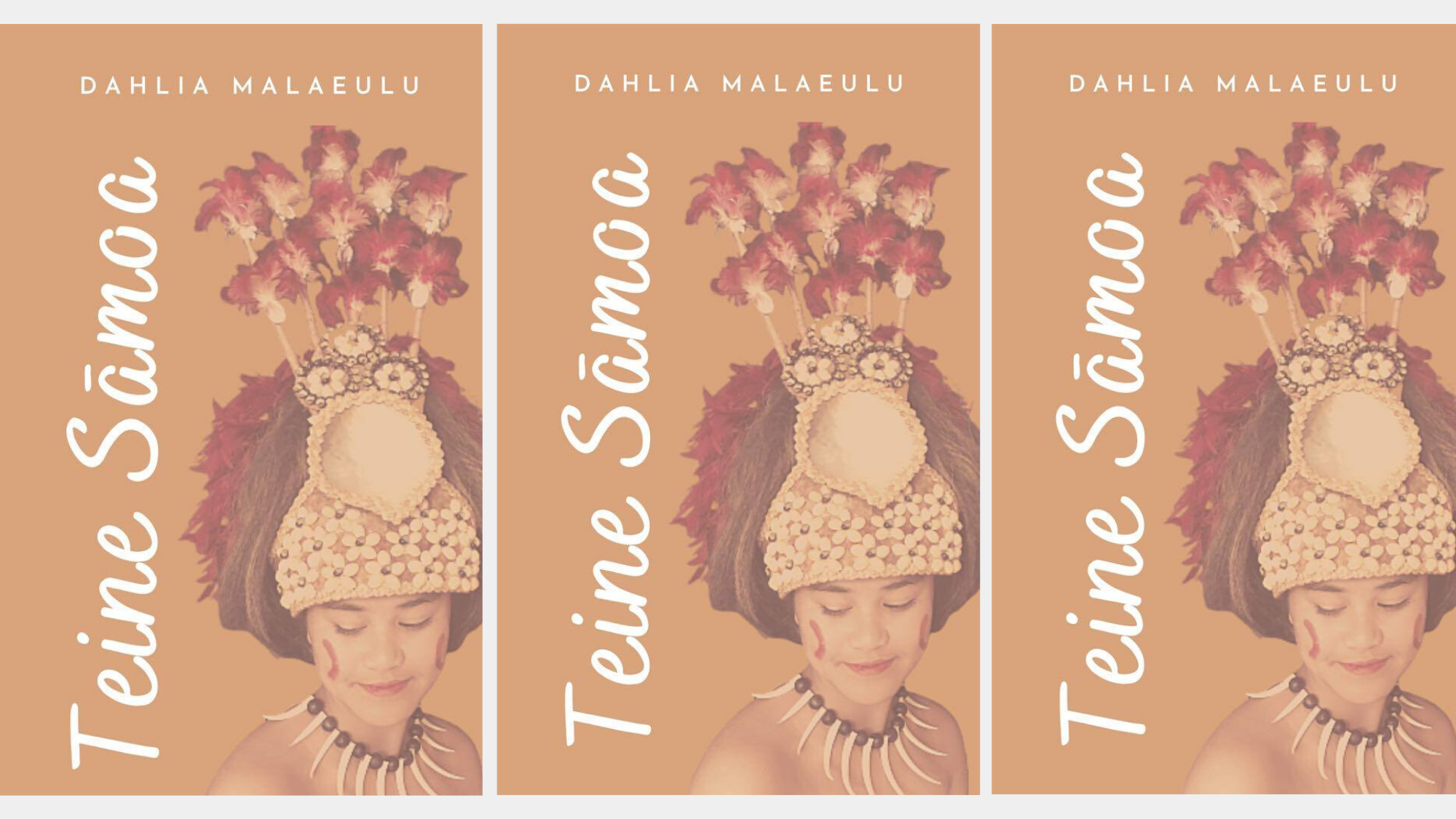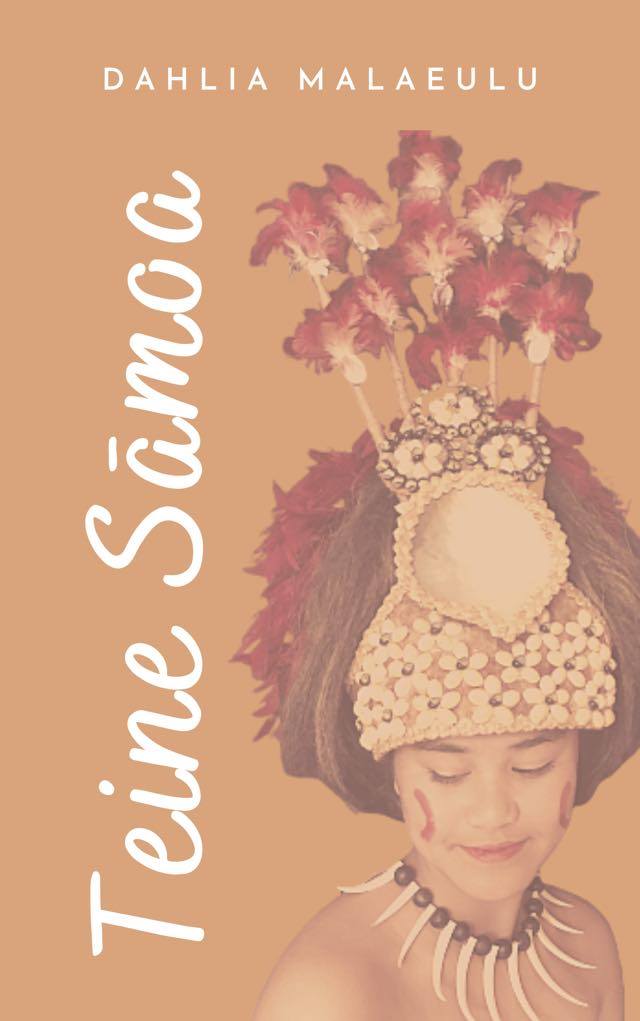By Dahlia Malaeulu
Manuia le Vaiaso o le Gagana Samoa 2020 – Happy Samoa Language Week 2020! Today we have an extract from Teine Sāmoa, by Dahlia Malaeulu, a new collection of short stories. ‘Teine Sāmoa means Sāmoan girl. It’s a label that carries with it an unspoken duty to obey, serve and respect your family and Sāmoan culture. But who can be teine Sāmoa? When should you be teine Sāmoa? And how can you be teine Sāmoa outside of Sāmoa?’
Later this week we will publish an essay from Dahlia talking about how she wrote the book.

Chapter 2: Teuila Ekanesio
I walked into the kitchen to notify Mum: ‘Tinā o le faifeau lea ua sau.’
Mum quickly fired off instructions. ‘Va’ai poe ua vela kalo ma sa’eu le sapasui,’ while washing her hands and making her way to the lounge.
Being a teine Sāmoa can be lonely at times, especially when you’re the only girl and your brothers are useless. Armed with my ‘ie lavalava around my waist, my perfect high bun and welcoming smile, I was the first responder to feaus, cooking, babysitting, helping the other boys with homework; to ushering guests, to siva, to attend to, to help. All with a smile on my face. So when I got bored, I would make it all a game, like I was being judged for a Miss Sāmoa contest with only one contestant.
‘This teine Sāmoa job is no joke,’ I would say in my professional voice, making my friends Lani and Masina giggle. I could never keep a straight face, and I was the worst actor.
‘This teine Sāmoa job is no joke,’ I would say in my professional voice, making my friends Lani and Masina giggle.
‘Teuila,’ Mum called from the lounge.
‘O a’u lenei tinā,’ I said, quickly racing to her side and kneeling.
‘Tapena mai se iputī i luma nei,’ she said.
I took the orders for two teas – for the faifeau and mum – and one coffee, for dad. I returned balancing a tray on which were the hot drinks on hardly-ever-been-used saucers; a bowl of sugar and a small porcelain jug of milk, accompanied by a small selection of biscuits. As per my training, only the good plates and cutlery for church ministers.
I took my seat at the end of the room near the lounge door, in case my parents or the visitors needed anything. Everything was a sign or symbol of fa’aaloalo or respect. From my ‘ie lavalava tied around my waist, which draped around my legs covering my lower body, to ensuring I used ‘tulou’ when I walked in front of anyone, especially adults or elders. Serving our visitors their refreshments sitting to the side of the coffee table, not in front of them.
Everything was a sign or symbol of fa’aaloalo or respect. From my ‘ie lavalava tied around my waist, which draped around my legs covering my lower body . . .
Basically doing everything my parents said, to make them happy and proud.
And this makes me happy and proud. Everything I do represents my parents and my family in my islander world and the palagi world outside.
Then, out of the blue, Dad’s cell phone rang and he excused himself to answer it in the hallway.
‘Tālofa – oi! Oh, hello, John. How are ya mate?’ Dad answering the phone in his Sāmoan-English-Kiwi voice made me giggle to myself as I sat in my spot. If my brothers had been here we would have been re-enacting Dad being a ‘switcher’, as we call it. Something that’s a necessity, being an NZ-born teine Sāmoa.
We were all professional switchers, and Mum would say, ‘Fa’amuamua lau gagana Sāmoa i totonu o lou āiga auā a ē alu i le ā’oga, ona maua lea o le gagana inilisi.’ So basically it was: ‘Sāmoan at home, English at school – Teine Sāmoa at home and teine palagi outside.’
We were all professional switchers, and Mum would say, ‘Fa’amuamua lau gagana Sāmoa i totonu o lou āiga auā a ē alu i le ā’oga, ona maua lea o le gagana inilisi.’
Mum’s English is polished, as she’s an office manager and it’s a requirement to speak good clear English, I guess. Dad, on the other hand, knows phrases well, but the gaps in his English show when he tries to string a sentence together, which is probably why he speaks in short English sentences.
For me, it was the same at school. I spoke perfect English and was a professional chameleon. I knew when and how to be a teine Sāmoa, and I saw how hard my parents worked in our Sāmoan and palagi world. I needed to do the same. I did everything to make them proud.
Our household was Sāmoan-speaking-only until the outside world came in, and then English was on. English was for school and work. But sometimes these two very different worlds would overlap too.
Mum once told me that when I started school, the palagi teacher suggested that she speak more English at home, as I was getting confused with the pronunciation of vowels when trying to read English books. Then at intermediate, my teacher told me I needed to participate more in discussions and ask more questions. But questioning was definitely not part of being a teine Sāmoa. We also don’t have the freedom to hang out with friends, talk on the phone or worry about our nails. I can still hear my mum saying, ‘O le teine Sāmoa e iloa ona o tomai i le faiga o le āuli, tagamea, kuka ma fe’au uma o le lotoifale.’
Then at intermediate, my teacher told me I needed to participate more in discussions and ask more questions. But questioning was definitely not part of being a teine Sāmoa.
Even having friends was frowned upon; they were considered distractions unless they were godly girls from church. Luckily I had Masina, who understood all the teine Sāmoa issues I was going through, Masina being the daughter of our faifeau – our guest that day – and thankfully I also had Lani, who was a junior prefect with me at school, so she passed my parents’ high educational standards and expectations. Plus, she was half palagi so she was destined to win in the palagi world and could help me, according to my parents.
Extracted with permission from Teine Sāmoa by Dahlia Meleoulu,




